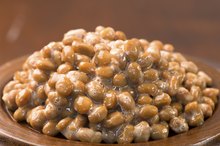Can I Take Vitamins Before a Fasting Blood Test?
Your doctor may have prescribed a fasting blood test to reveal your health status or risk factors for disease. If you’re not used to fasting, this seemingly simple requirement can raise many questions about what you can and can’t eat, drink or ingest. Anything that you take in, including vitamins or other supplements, may alter your blood chemistry to a degree that affects its analysis. In some cases, your doctor may tell you to skip your morning vitamin and wait to take it until after your blood draw.
Laboratory Instructions
Any of a dozen or more blood tests may entail prior fasting, including those that measure blood glucose, lipoprotein, cholesterol, enzyme, vitamin and other nutrient levels. Because tests may be ordered for different reasons and health conditions vary from patient to patient, fasting directions are not the same for every person or every type of blood test. Depending on their impact on your particular test, substances such as food, beverages, medications and vitamin, mineral or herbal supplements, may be denied for a period prior to your scheduled appointment. You should discuss your current diet with your doctor, as well as all medications you take, and receive or request detailed instructions beforehand.
- Any of a dozen or more blood tests may entail prior fasting, including those that measure blood glucose, lipoprotein, cholesterol, enzyme, vitamin and other nutrient levels.
- Depending on their impact on your particular test, substances such as food, beverages, medications and vitamin, mineral or herbal supplements, may be denied for a period prior to your scheduled appointment.
Your Current Diet
High Liver Enzymes, Fasting and Blood Tests
Learn More
Consider that compounds from everything you eat, drink, chew, swallow or smoke on a regular basis, enter your bloodstream. Any of these elements can affect the outcome of your blood test and necessitate another sample or even cause a misdiagnosis. The particular test or group of tests that you are having will determine whether you can have any, some or none of these substances during the fasting period.
Your Fasting Diet
Your health care provider or laboratory staff will let you know exactly what you can and cannot have while fasting according to test protocol. Some tests require a water-only fast. Some may or may not allow vitamins and supplements, black coffee or tea, or regular meals with certain exclusions. If you’re being tested for vitamin A, for instance, you may be instructed to suspend your multivitamin dose. Factors in your individual instructions include your current health condition, dietary habits and the goal of the blood work. Even if you’ve had the same test before, fasting directions may change.
- Your health care provider or laboratory staff will let you know exactly what you can and cannot have while fasting according to test protocol.
Other Considerations
Tea & Fasting for a Blood Test
Learn More
Fasting for blood glucose tests may last as little as two hours, while most other tests need eight to 12 hours of dietary abstinence. Eat a balanced meal prior to your fasting period and again after your blood sample has been taken. Meet every criteria your doctor gives you, and if you make a mistake and take one of your supplements, let the laboratory technician know as soon as you arrive for your blood test.
Related Articles
References
- Kaiser Permanente: Fasting Instructions for Chemistry Tests
- American Association for Clinical Chemistry: Test Preparation: Your Role
- Health Information Translations: Fasting Blood Sugar Test
- National Heart Lung and Blood Institute: Common Blood Tests
- Collier R. Intermittent fasting: the next big weight loss fad. CMAJ. 2013;185(8):E321–E322. doi:10.1503/cmaj.109-4437
- Patterson RE, Laughlin GA, LaCroix AZ, et al. Intermittent fasting and human metabolic health. J Acad Nutr Diet. 2015;115(8):1203–1212. doi:10.1016/j.jand.2015.02.018
- Varady KA, Bhutani S, Church EC, Klempel MC. Short-term modified alternate-day fasting: a novel dietary strategy for weight loss and cardioprotection in obese adults. Am J Clin Nutr. 2009;90(5):1138-43. doi:10.3945/ajcn.2009.28380
- Arnason TG, Bowen MW, Mansell KD. Effects of intermittent fasting on health markers in those with type 2 diabetes: A pilot study. World J Diabetes. 2017;8(4):154–164. doi:10.4239/wjd.v8.i4.154
- Trepanowski JF, Kroeger CM, Barnosky A, et al. Effect of alternate-day fasting on weight loss, weight maintenance, and cardioprotection among metabolically healthy obese adults: a randomized clinical trial. JAMA Intern Med. 2017;177(7):930-938. doi:10.1001/jamainternmed.2017.0936
- Zhang J, Zhan Z, Li X, et al. Intermittent Fasting Protects against Alzheimer's Disease Possible through Restoring Aquaporin-4 Polarity. Front Mol Neurosci. 2017;10:395. Published 2017 Nov 29. doi:10.3389/fnmol.2017.00395
- Harvie M, Howell A. Potential benefits and harms of intermittent energy restriction and intermittent fasting amongst obese, overweight and normal weight subjects-A narrative review of human and animal evidence. Behav Sci (Basel). 2017;7(1):4. Published 2017 Jan 19. doi:10.3390/bs7010004
- Barnosky AR, Hoddy KK, Unterman TG, Varady KA. Intermittent fasting vs daily calorie restriction for type 2 diabetes prevention: a review of human findings. Translational research: The Journal of Laboratory and Clinical Medicine. 2014;164(4):302-11.
- Martin B, Mattson M, Maudsley S. Caloric restriction and intermittent fasting: Two potential diets for successful brain aging. Ageing Res Rev. 2006;5(3):332-353.
- St-Onge MP, Ard J, Baskin ML, Chiuve SE, Johnson HM, Kris-Etherton P, et al. Meal Timing and Frequency: Implications for Cardiovascular Disease Prevention: A Scientific Statement from the American Heart Association. Circulation. 2017;135(9):e96-e121.
- Stote KS, Baer DJ, Spears K, et al. A controlled trial of reduced meal frequency without caloric restriction in healthy, normal-weight, middle-aged adults. Am J Clin Nutr. 2007;85(4):981-8.
- Zauner C, Schneeweiss B, Kranz A, et al. Resting energy expenditure in short-term starvation is increased as a result of an increase in serum norepinephrine. Am J Clin Nutr. 2000;71(6):1511-1515.
- The International Classification of Headache Disorders, 3rd edition (beta version). Cephalalgia. 2013;33(9):629-808. doi:10.1177/0333102413485658
- Dalkara T, Kiliç K. How does fasting trigger migraine? A hypothesis. Curr Pain Headache Rep. 2013;17(10):368. doi:10.1007/s11916-013-0368-1
- Torelli P, Manzoni GC. Fasting headache. Curr Pain Headache Rep. 2010;14(4):284-91. doi:10.1007/s11916-010-0119-5
- Torelli P, Evangelista A, Bini A, Castellini P, Lambru G, Manzoni GC. Fasting headache: a review of the literature and new hypotheses. Headache. 2009;49(5):744-52. doi:10.1111/j.1526-4610.2009.01390.x
Writer Bio
Nancy Clarke began writing in 1988 after achieving her Bachelor of Arts in English and has edited books on medicine, diet, senior care and other health topics. Her related affiliations include work for the American Medical Association and Oregon Health Plan.








